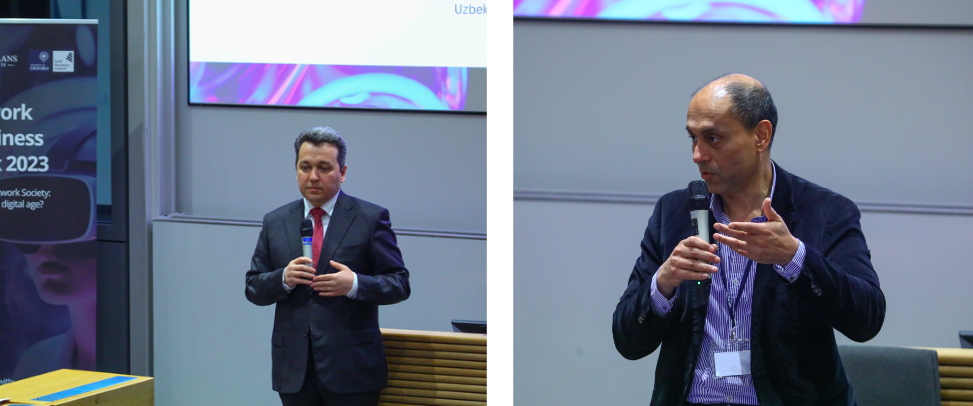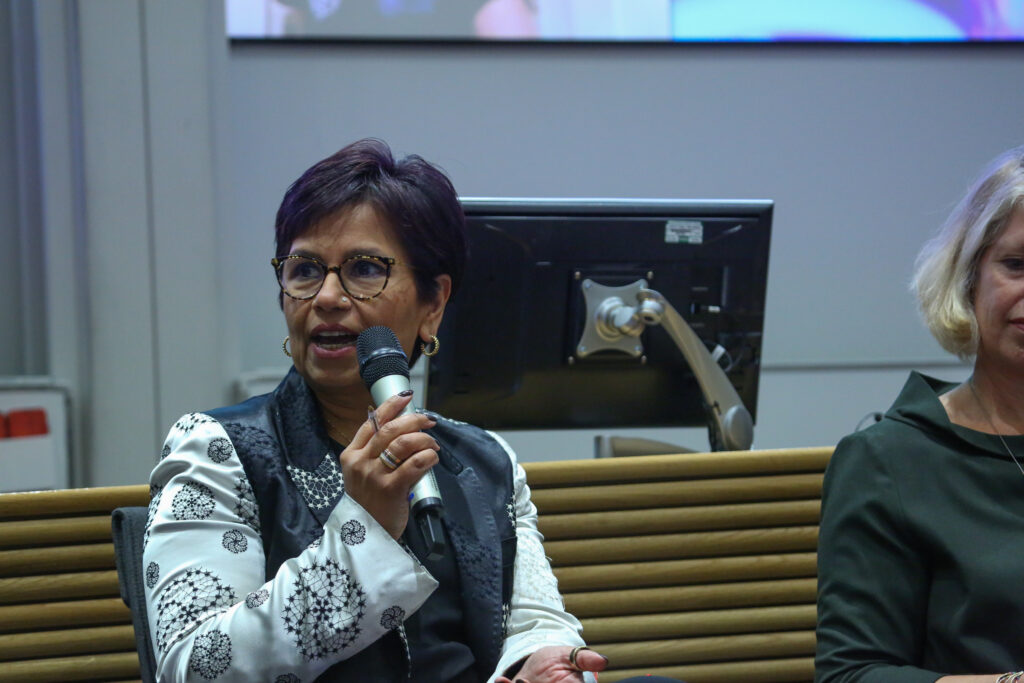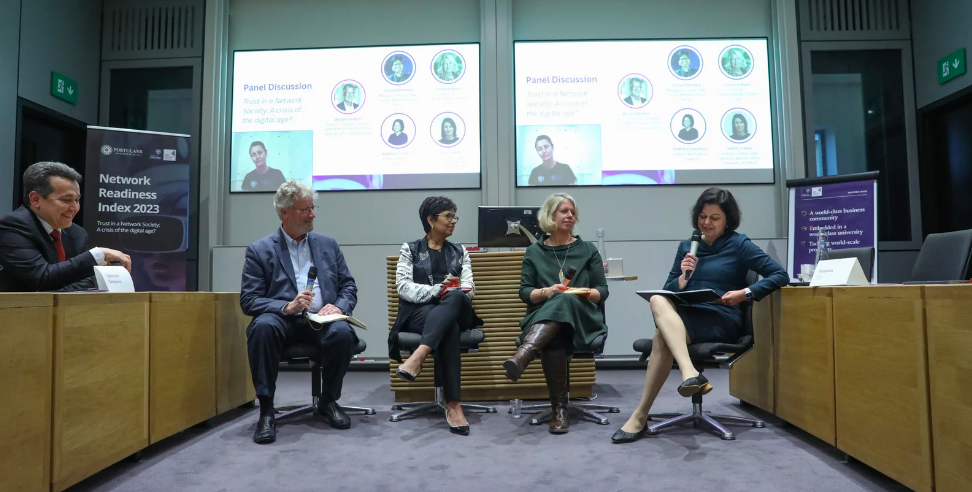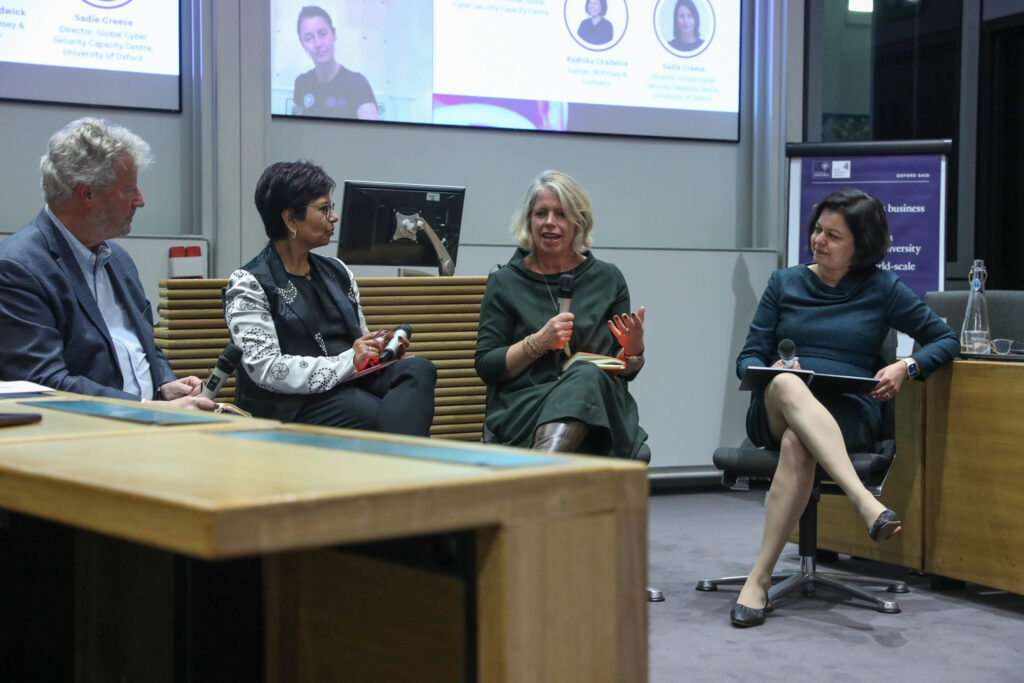The 2023 edition of the Network Readiness Index (NRI) has launched, revealing the most digitally ready economies in the world, and providing insights into the current state of global digital transformation.
The global launch event, held at Saïd Business School, University of Oxford on November 20th brought together ministers, industry leaders, academics, and civil society experts from around the world.

The event opened with remarks from Soumitra Dutta (Dean, Saïd Business School; President, Portulans Institute), who underscored the NRI as a tool for framing discussions around the digital future. Amidst the rapid progress and increasing complexity of technology, measuring aspects like trust and inclusion will be increasingly challenging, but increasingly critical.
“The NRI is the leading index on technology and ICTs, but also the longest running. In 2000, it was not as obvious to think about the social aspects of technology. Today’s NRI, however, accounts for the human element as well as key issues like trust, inclusivity, and economic and social impact. It aspires to be on the frontier of measuring digital transformation.”
Soumitra Dutta, Dean, Saïd Business School and President, Portulans Institute
Opening addresses from leaders in government, industry, and civil society shed light on the value of digital technology for promoting economic growth, increasing living standards, and fostering sustainability. NRI metrics continue to provide decision makers with data-driven insights, and play a key role in fostering dialogue, shaping policies, and advancing technology for inclusive progress at the global scale and across industries.
“Uzbekistan’s population is growing by almost one million a year, many of them being young people. We are improving our education system so that upcoming graduates are well prepared for the digital economy. I am hopeful that these efforts reflect in our country’s level of network readiness.”
Sherzod Shermatov, Minister of ICT, Republic of Uzbekistan
“While we have scaled to be a very large organization, only 10-15% of workloads have moved to the cloud, so it’s still early days. It’s the education that we are doing through reports like these around digital readiness and its impact on economic growth and sustainability that we need to continue.”
Tanuja Randery, Managing Director, AWS Europe, Middle East and Africa

“In Colombia, better policies in terms of technology and ICT would mean better quality of life, greater competitiveness, more jobs, and economic growth.”
Diego Molano, Former Minister of ICT, Colombia
“We need better measurements and neutral assessments of how our digital world is growing and faring. This year’s NRI, focused on the issue of trust, is a step in the right direction.”
Bruno Lanvin, Co-author and Co-editor, NRI
“Our collaboration around the NRI 2023 is a powerful alliance. We’re committed to aligning technology with human values, promoting transparency, accountability, and collective responsibility to solidify trust in technology’s transformative potential.”
Khalid Al Kubaisi, CEO, malomatia
Portulans Institute CEO, Rafael Escalona Reynoso, presented an overview of global trends in digital transformation and this year’s theme, which focuses on the state of trust in the network society.
Key takeaways from this year’s report include:
- Trust in digital technologies has declined over the last decade due to factors like social media influence, AI advancements, and data privacy concerns.
- Trust and digital inclusion are linked, with economies high in digital inclusion generally trusting technology more.
- High-income economies, especially European countries, lead the NRI with 16 of the top 25 spots.
- Middle-income countries like Malaysia, Thailand, Brazil, and Vietnam are improving in the NRI, using digitalization to transform their economies.
- China, now in the top 20, is the only middle-income economy in the NRI’s top quartile.
- Some middle-and low-income economies, mainly in Africa and Asia & the Pacific, exceed expectations in the NRI, with Rwanda being a notable low-income performer.
- Arab States are focusing on digital workforce skills, making progress in the People pillar of the NRI.
- The Americas are recognized for comprehensive digital strategies and balanced digital evolution. However, most Latin America and the Caribbean economies still lag behind.
Read the full press release here.
A stimulating panel discussion, moderated by William Dutton (Director, Portulans Institute) surfaced valuable perspectives on the topic of rebuilding trust in the network society.

Trust is a basic enabler of technology adoption, but is increasingly challenging to foster. While questions remain around who is responsible for its re-establishment, it is clear that the future will require a concerted effort from government, industry, academia, and civil society, each with a distinct role to play.
“Lack of trust is inherent and embedded into the fabric of digital societies. The question moving forward will be how we manage it.”
Victoria Nash, Director, Oxford Internet Institute
Panelists from industry highlighted the importance of responsible development in the technology sector, and developing tools that reflect customer values in order to foster a culture of trust and drive adoption. Today, consumer priorities revolve primarily around the security of data and robust infrastructure.
“Digital technology is a major contributor to economic growth, living standards, and sustainability, especially in developing economies. There is much growth to be seen from AI adoption, however the problem is we don’t have enough companies, businesses, and governments adopting it at the pace that is needed to drive maximum economic growth. Currently, less than 30% of businesses use some form of cloud computing, which reflects an issue of confidence in the technology.”
Tauja Randery, Managing Director at Amazon Web Services (AWS) EMEA
“The need for confidence is increasing, the visibility of breaches is increasing, and the importance for data protection is increasing in the eyes of the consumer. Consumers vote with their wallet on trust: they rate trustworthiness and data protection on par with price, quality, convenience and speed.”
Radhika Chadwick, Partner, McKinsey & Company
However, responsibility does not only fall on companies and consumers. Policy action and oversight, in the form of appropriate regulation and frameworks, will also play a pivotal role in building trust in the digital age. Such actions should focus on encouraging tech companies to implement robust cybersecurity, educating individuals about their digital rights, and setting global precedent for data practices.
“We must build in the right behaviors in institutional and organization environments to try to ensure that every party is doing what they can to provide the kind of oversight that we need and ensure that we are protected. Because, in the end, that is what enables us to take more risks, be more creative and innovative.”
Sadie Creese, Director, Global Cyber Security Capacity Centre, University of Oxford
“Regulation today is far slower and less adaptable than we need it to be. What COVID showed us is that in a crisis, we have to make very fast decisions with very limited data, and we have to adapt based on what is and is not working very quickly. Regulation needs to be more adaptive, and we almost have to reframe how we think about how we regulate and the data we use to do so.”
Radhika Chadwick, Partner, McKinsey & Company

Panelists also highlighted the role of skilling and education in fostering trust, supporting inclusion, and advancing diversity in the digital age. In a world where digital technology has penetrated nearly every aspect of life, the conversation must move beyond who has access to technology, towards understanding who has access to the social and economic benefits that technology can provide. This involves critically looking at urban-rural gaps and digital gender divides, and who has the agency to address these issues.
“If we leave part of the world behind on digital adoption, we lose the ability to have them contribute to answering global challenges. It is in the interest of humanity to make sure everybody is a part of this technology revolution, no matter where they come from.”
Sadie Creese, Director, Global Cyber Security Capacity Centre, University of Oxford
The discussion concluded with remarks around the future of trust in the digital world, with an eye towards demystifying emerging technologies and their potential risks and benefits.
“There is a degree of alarm that happens at the advent of any revolution. We must be careful of the assumption that lack of trust is necessarily a bad thing. We never want to get rid of ‘reasonable’ trust, which is based on critical faculties determining whether content is accurate and trustworthy and secure.”
Victoria Nash, Director, Oxford Internet Institute
Officially in the 5th edition of its renewed model, the Network Readiness Index remains a powerful tool for developing and evaluating policies to promote digital transformation, and benchmarking progress on the regional and global scale.
Portulans Institute extends its gratitude to our 2023 Knowledge Partners at Amazon Web Services (AWS), Brazilian National Confederation of Industry (CNI) and malomatia for their contributions, to Saïd Business School and University of Oxford for hosting the event, to our panelists and speakers for an enriching conversation, and to all who attended virtually and in-person for the continued support.
The 2023 Network Readiness Index is now available for download here.



